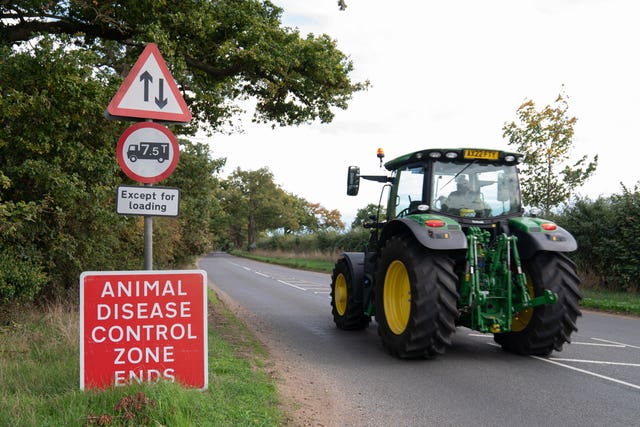Bird flu restrictions to cover England and Scotland as number of cases rise
The Department for Environment Food and Rural Affairs (Defra) said they are not currently expecting overall egg supplies to be affected.

Strict bird flu restrictions have been put in place for the whole of England and Scotland following an increase in cases, the Government has announced.
A national Avian Influenza Prevention Zone (AIPZ) came into force for the whole of England and Scotland at noon on Saturday in a bid to mitigate the risk of the disease spreading amongst poultry and other captive birds.
It is now a legal requirement for all bird keepers in Scotland and England to follow strict rules to protect their flocks from the threat of avian flu – including keeping birds indoors.

The highly contagious avian influenza virus is currently circulating in wild birds in the UK and their risk to poultry and other captive birds is currently assessed as being very high, the Department for Environment Food and Rural Affairs (Defra) said.
A Defra spokesperson added the department is not currently expecting overall egg supplies to be affected, but that they are “working closely with industry to monitor the impacts of the outbreak”.
UK chief veterinary officer Christine Middlemiss said: “Given the continued increase in the number of bird flu cases across England, we are taking further action to try and prevent the further spread of disease.
“I urge bird keepers to check which requirements apply to them, to continue to exercise robust biosecurity measures, remain alert for any signs of disease and report suspected disease immediately to the Animal and Plant Health Agency.”
The current risk to human health remains low and properly cooked poultry and poultry products, including eggs, are safe to eat, the Government added.
The measures apply to all bird keepers whether they have pet birds, commercial flocks or just a few birds in a backyard flock.
Rules include regularly changing clothing and footwear before entering bird enclosures for keepers with more than 500 birds, as well as cleansing and disinfecting site vehicles.
A mandatory housing order in force across the East Riding of Yorkshire, City of Kingston Upon Hull, Lincolnshire, Norfolk and Suffolk has been extended in the north of England to cover York and North Yorkshire.
A new housing order has also been issued for Shropshire following an outbreak in the county and is due to come into force on Monday.
Scotland’s deputy chief vet officer Jesus Gallego said: “While the risk to public health is very low, we are currently experiencing a heightened risk of an incursion from this virus and so it is vital that appropriate precautions are taken to protect poultry and other captive birds from infection.
“The introduction of this zone is a preventative measure, aimed at minimising the effect that this often devastating virus can have on Scottish-kept birds”.
The Nation Farmers Union (NFU) backed the Government’s decision, adding that bird flu outbreaks can have a “huge emotional and financial” impact on farming families.
The NFU’s poultry board chairman James Mottershead said: “We are pleased the government has acted promptly on this issue to protect the national flock with an AIPZ being implemented across England and Scotland with the Welsh Government expected to follow shortly.
“While housing measures have been extended into Shropshire, York and North Yorkshire, we urge the respective governments to keep this under constant review and extend this requirement where necessary.
“Outbreaks of avian influenza can put huge emotional and financial strain on farming families.
“Farmers take such care to protect the health and welfare of their birds and it’s devastating to see that compromised.
“In light of cases of avian influenza being confirmed and the increased risk levels for both wild birds and poultry, I urge all bird keepers, regardless of their size or location, to remain vigilant, maintain stringent biosecurity measures and report any signs of disease in their birds at the earliest opportunity.”





